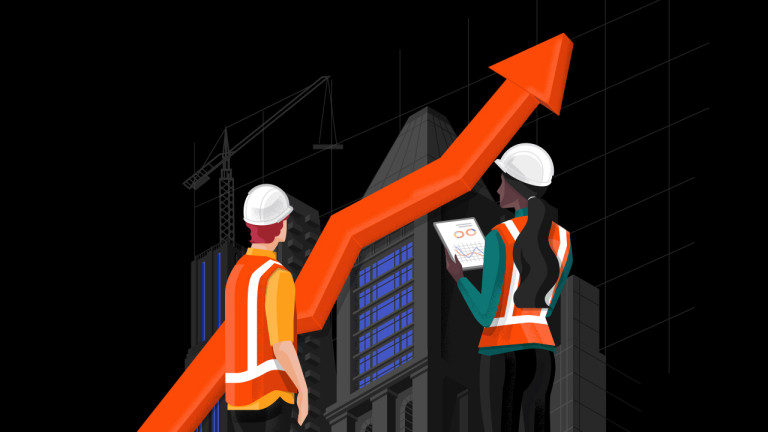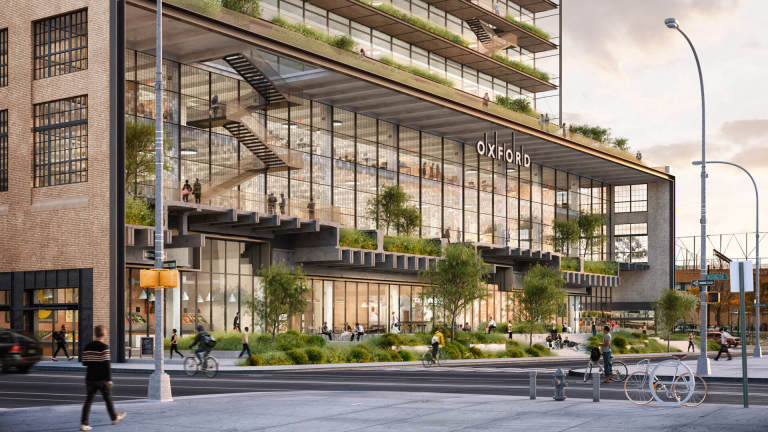
Groundbreaker Profile
Christina Riley
Christina Riley is Leading Construction’s Diversity and Inclusion Conversation

“Yes, I have an interesting story — but my story is actually about equality and inclusion for everybody in construction. This has given me a platform to help others like me in construction while supporting other minorities — women as well — that face huge challenges within the industry.”

Christina Riley
Senior Planner
Quinn London
What is your role at Quinn London?
I'm a Senior Planner for Quinn. So in the UK you get town planners, who work for the local authority, but then you get construction planners. Basically, my job is to look at logistics, look at scaffolding, tower crane design—how you're actually going to build it, how you're going to set a construction site up. You might look at the phasing of the projects and the methodology. I do both work winning and live project reporting as well. It’s a really great job.
Christina, you’re a change agent in the construction industry, and you’ve mentioned 2015 as the year you began your role as an advocate — speaking to groups, representing, giving hope and energy to many, and changing workplace dynamics. What would you say was the true beginning of your journey?
I transitioned from male to female in 2014—while keeping my job. I say that because a lot of transgender people often feel they have to change jobs during their transition because they're quite terrified of going through that process while working in their current jobs, or even within construction itself. I've been in the industry getting on 30 years now. And culturally, it's not been very inclusive.
So my journey began, I suppose, in March 2014—which is when I transitioned, when I came out to my directors. I was at Balfour Beatty at the time, and that was a result of them having an LGBT network and employee resource group. So they launched this network back in March 2014. I was already contemplating my transition, but I never knew how to go about that. I was terrified, to be honest. I felt I had to do it, but because I didn't know how, I actually suffered for quite a long time with panic attacks. That's something I talk about in my journey —about mental health and how I suffered from chronic anxiety for quite a long time, for about 10 years previous.
But to cut a long story short, I did come out at work—and they supported me and facilitated my transition. And now it's been . . . gosh, what is it, six, seven years now? And it's made my life, in terms of my happiness level, much better.
Can you speak to how that conversation has evolved in the construction industry since you came out, since you transitioned? Have you seen anything like a sea change in the way the construction culture approaches diversity?
So, in 2014, there was nothing really. I think there was only one company in the whole industry that was really doing anything, and I think that was Arup, who I believe probably are international as well. They're an engineering company. In 2015, I connected with somebody at Arup— a chap called Ben. I found out they had an LGBT network at Arup, and Balfour Beatty was just then really getting going on that front, as I’ve said.
Ben and I set up an industry network called Building Equality, with the immediate aim to attend the London Pride for the construction industry. This had never been done. You had never seen builders walking through the streets of London for a Pride event. We met up and we joined three other companies, and that became the launch of the Building Equality network.
It’s fairly amazing that you went from this life of extreme anxiety, to becoming a trailblazing leader of this movement in construction. That's literally awesome.
It amazes me as well to be honest. For 10 years I was on beta blockers. My heart used to race. And the only thing that cured me was coming out. And so this is another thing, in my toolbox talks about mental health, some of the safety issues you can't see because it's internalized. When you internalize the worry of coming out as who you are, that again affects your concentration on the construction site. And if you're not concentrating, you're not looking out for your own personal safety.

So one aspect of your journey does circle back to jobsite safety. A worker internalizing all that anxiety is not making the jobsite a safer place.
How you're treated as a person within the industry, how that might affect your mental health perhaps — the knock-on effects of that affect your safety on-site. If you're receiving inappropriate language or bullying because of who you are as a person, that can affect your emotional state, your concentration. And in turn, that loss of concentration can actually impact jobsite safety as well as obviously your own personal emotional safety.
Was there some particular event or moment that really marked Christina’s arrival in the workplace, and how did that play out?
Literally on my very first day coming out as Christina, I attended an awards night for the chair of the Balfour Beatty network. It was like a baptism of fire for me. All of a sudden I was actually at an event hosted by the Financial Times in London—surrounded by chief executives and directors. And I was out for the first time as Christina. First time I had been made up, looking different.
And yet, I was just treated … quite normally! I'm surrounded by all these senior figures and people that maybe in the past— not those particular people, of course, but people in those senior positions—might have actually turned their nose up at seeing an LGBT person or transgender person in the industry. You know, you could have probably lost your job perhaps, if you went back 5 or 10 years.
I suppose it just lit a little fire inside of me about actually there's something I can do here. Because I never ever transitioned thinking I would be doing this. I never transitioned thinking I'll be doing public speaking or advocating about disability or gender or ethnicity or LGBT. It never even occurred to me.
How did you initially come to construction, Christina?
I did my A levels, which when you're like 17 or 18, that's when you do your lastexams in the UK. And through those qualifications, I ended up going to university at Bristol and I earned a building engineering management degree, which is a four-year degree. My third year was out onsite, working at Oxford University actually, building a quite prestigious, white precast concrete building for student accommodation, with an auditorium and all sorts of things. It was, at the time, a groundbreaking project really.
So, for me, as a young . . . back then, I was Chris. So I was a young boy. Used to hold the tape and the laser and do the sussing out with the engineer. When I graduated, I actually got a job back with the same company, and the rest is history. It was a company called Galliford Try. I was there for 20 years.
You’ve not only seen massive change in the industry, you’ve played a large part in ushering in that change. Co-founder of Building Equality, Construct-Ability, and EDI Construct (campaigning on diversity and inclusion), and a widely recognized ambassador for STEM careers, LGBTQ+ rights and increased awareness around disability, non-visible disability and neurodiversity. Has the industry truly taken up the diversity cause?
I mentioned earlier that Building Equality—our attending of London Pride—began with four companies. If we fast-forward, we've now attended Prides all over the country. We've attended Pride in London probably four times I think. But we've been to Manchester and Birmingham and Leeds and other big cities in the UK. The network grew through recruiting other main contractors and other organizations, like the Chartered Institute of Building, Skanska, and Kier. So there are now up to 60 or 70 companies that belong to this network. The outreach of the network across those companies is over 300,000 people.
So I suppose that demonstrates how far the industry has come. But at the same time, 70 companies isn't actually a lot when you think about the whole supply chain and the whole industry, which runs into thousands of companies. There’s still a long way to go in terms of educating the smaller companies and the self-employed people, and also the SMEs, as well as the bigger companies.
At Procore we use a term —“Groundbreaker”— to broadly describe an individual who casually inspires, leads from alongside, embraces the cutting edge, and is driven to set a new standard. How might you personally define a Groundbreaker based on your experiences?
I think to be a groundbreaker, you've got to put your head above the parapet and go places where perhaps other people haven't been before or areas that might be a bit taboo or areas that aren't necessarily boardroom topics. So being able just to be brave enough to talk about these things and not feel intimidated—to be actually proud of what you're talking about—that’s important.
Sometimes the best leadership is to step back and let somebody else shine; create the opportunity for somebody else be a groundbreaker. That's the beauty of diversity, isn't it—that we all have different ideas. Because we all have that ability and capacity to do something groundbreaking.






